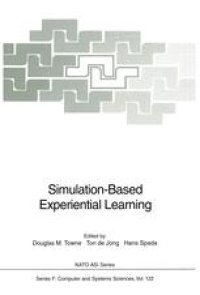
Ebook: Simulation-Based Experiential Learning
- Tags: Artificial Intelligence (incl. Robotics), Simulation and Modeling, Business Information Systems
- Series: NATO ASI Series 122
- Year: 1993
- Publisher: Springer-Verlag Berlin Heidelberg
- Edition: 1
- Language: English
- pdf
In October of 1992 an assembly of researchers in simulation and computer models for instruction convened in Bonas, France, to learn from one another in a non-automated environment. The event was the Advanced Research Workshop entitled The Use of Computer Models for Explication, Analysis, and Experiential Learning. Sponsored by the Scientific Affairs Division of NATO, this workshop brought together 29 leading experts in the field loosely described as instruction and learning in simulation environments. The three-day workshop was organized in a manner to maximize exchange of knowledge, of beliefs, and of issues. The participants came from six countries with experiences to share, with opinions to voice, and with questions to explore. Starting some weeks prior to the workshop, the exchange included presentation of the scientific papers, discussions immediately following each presentation, and informal discussions outside the scheduled meeting times. Naturally, the character and content of the workshop was determined by the backgrounds and interests of the participants. One objective in drawing together these particular specialists was to achieve a congress with coherent diversity, i.e., we sought individuals who could view an emerging area from different perspectives yet had produced work of interest to many. Major topic areas included theories of instruction being developed or tested, use of multiple domain models to enhance understanding, experiential learning environments, modelling diagnostic environments, tools for authoring complex models, and case studies from industry.
Content:
Front Matter....Pages I-XIV
Building Domain Models to Support Instruction....Pages 1-15
Knowledge Structures for a Computer-Based Training Aid for Troubleshooting a Complex System....Pages 17-32
Authoring Interactive Graphical Models for Instruction....Pages 33-45
Visualization in Educational Computer Modeling....Pages 47-60
Diagnosis of Intentions and Interactive Support of Planning in a Functional, Visual Programming Language....Pages 61-76
The Flexible Use of Multiple Mental Domain Representations....Pages 77-89
Computer-Based Support for Analogical Problem Solving and Learning....Pages 91-104
Modeling Actors in a Resource Dilemma: A Computerized Social Learning Environment....Pages 105-120
Basic Research on the Pedagogy of Automated Instruction....Pages 121-132
Modeling Practice, Performance, and Learning....Pages 133-147
Teaching and Learning Diagnostic Skills in a Simulation Environment....Pages 149-164
Environment Design and Teaching Intervention....Pages 165-176
A Model to Design Computer Exploratory Software for Science and Mathematics....Pages 177-189
Exploring a Domain with a Computer Simulation: Traversing Variable and Relation Space with the Help of a Hypothesis Scratchpad....Pages 191-206
Supporting Exploratory Learning by Offering Structured Overviews of Hypotheses....Pages 207-223
Exploration Strategies in an Economics Simulation Game....Pages 225-233
Determinants of Learning in Simulation Environments across Domains....Pages 235-248
SEPIA: An Intelligent Training System For French Nuclear Power Plant Operators....Pages 249-260
Learning Impacts of the Alpin Expert Systems on its Users....Pages 261-272
Back Matter....Pages 273-278
Content:
Front Matter....Pages I-XIV
Building Domain Models to Support Instruction....Pages 1-15
Knowledge Structures for a Computer-Based Training Aid for Troubleshooting a Complex System....Pages 17-32
Authoring Interactive Graphical Models for Instruction....Pages 33-45
Visualization in Educational Computer Modeling....Pages 47-60
Diagnosis of Intentions and Interactive Support of Planning in a Functional, Visual Programming Language....Pages 61-76
The Flexible Use of Multiple Mental Domain Representations....Pages 77-89
Computer-Based Support for Analogical Problem Solving and Learning....Pages 91-104
Modeling Actors in a Resource Dilemma: A Computerized Social Learning Environment....Pages 105-120
Basic Research on the Pedagogy of Automated Instruction....Pages 121-132
Modeling Practice, Performance, and Learning....Pages 133-147
Teaching and Learning Diagnostic Skills in a Simulation Environment....Pages 149-164
Environment Design and Teaching Intervention....Pages 165-176
A Model to Design Computer Exploratory Software for Science and Mathematics....Pages 177-189
Exploring a Domain with a Computer Simulation: Traversing Variable and Relation Space with the Help of a Hypothesis Scratchpad....Pages 191-206
Supporting Exploratory Learning by Offering Structured Overviews of Hypotheses....Pages 207-223
Exploration Strategies in an Economics Simulation Game....Pages 225-233
Determinants of Learning in Simulation Environments across Domains....Pages 235-248
SEPIA: An Intelligent Training System For French Nuclear Power Plant Operators....Pages 249-260
Learning Impacts of the Alpin Expert Systems on its Users....Pages 261-272
Back Matter....Pages 273-278
....